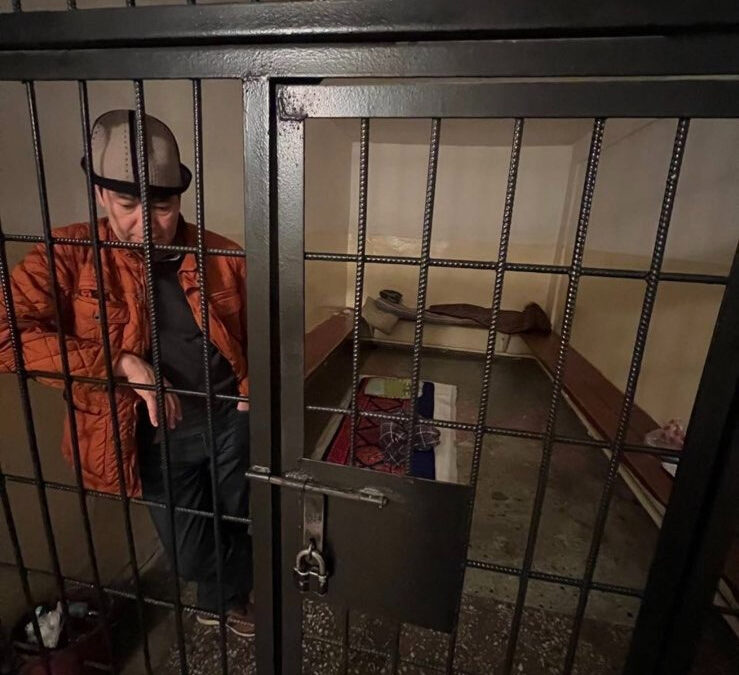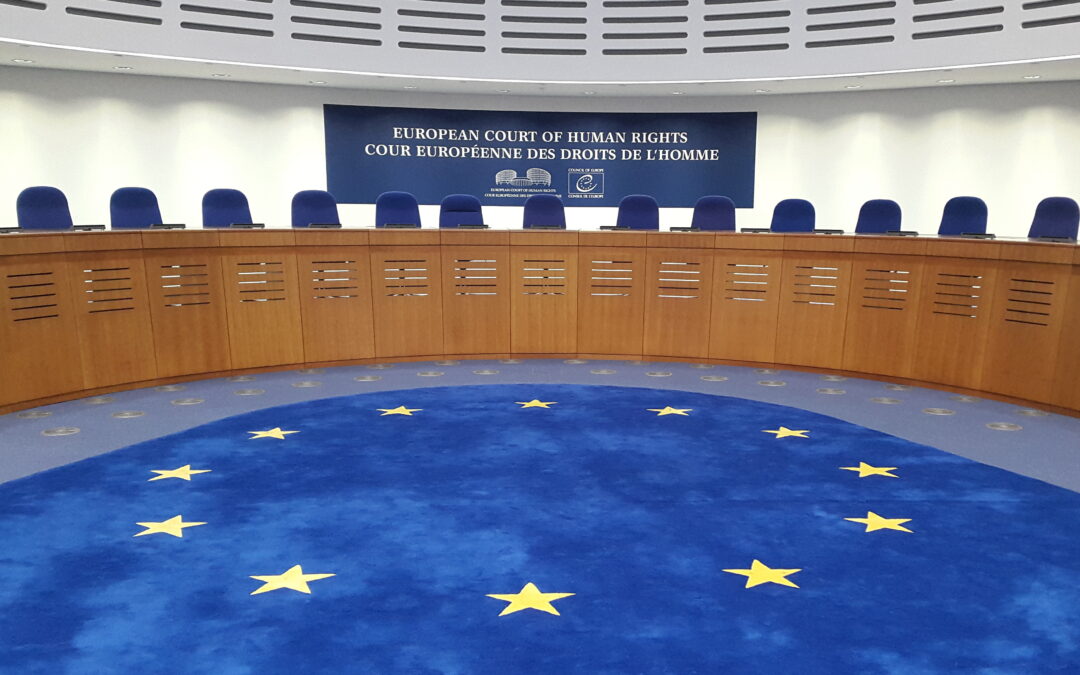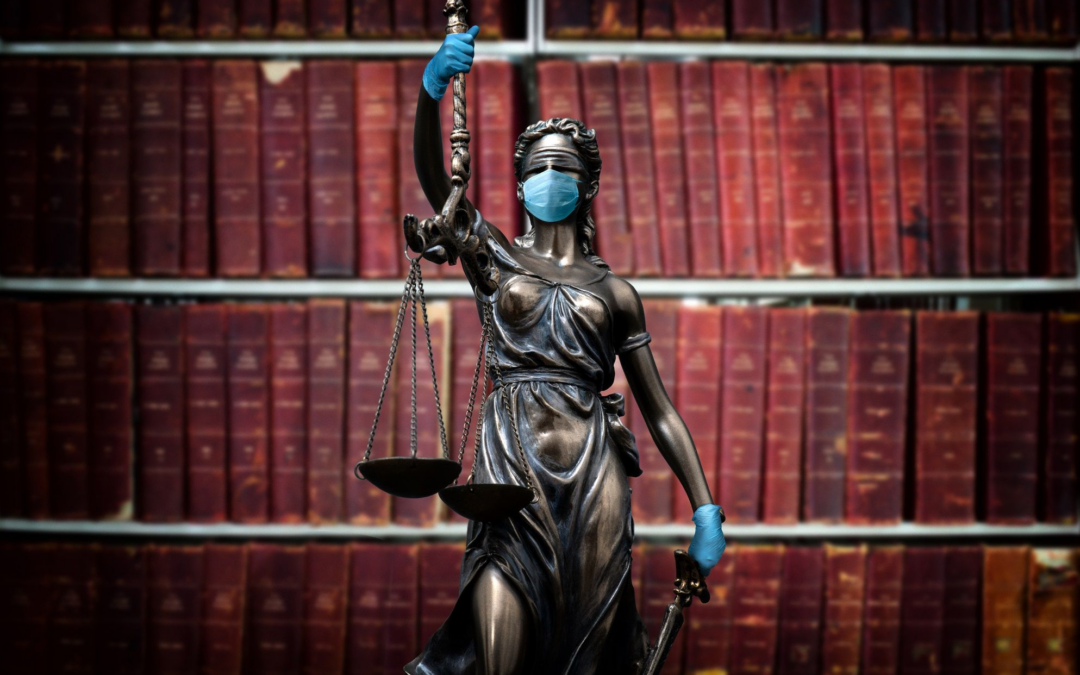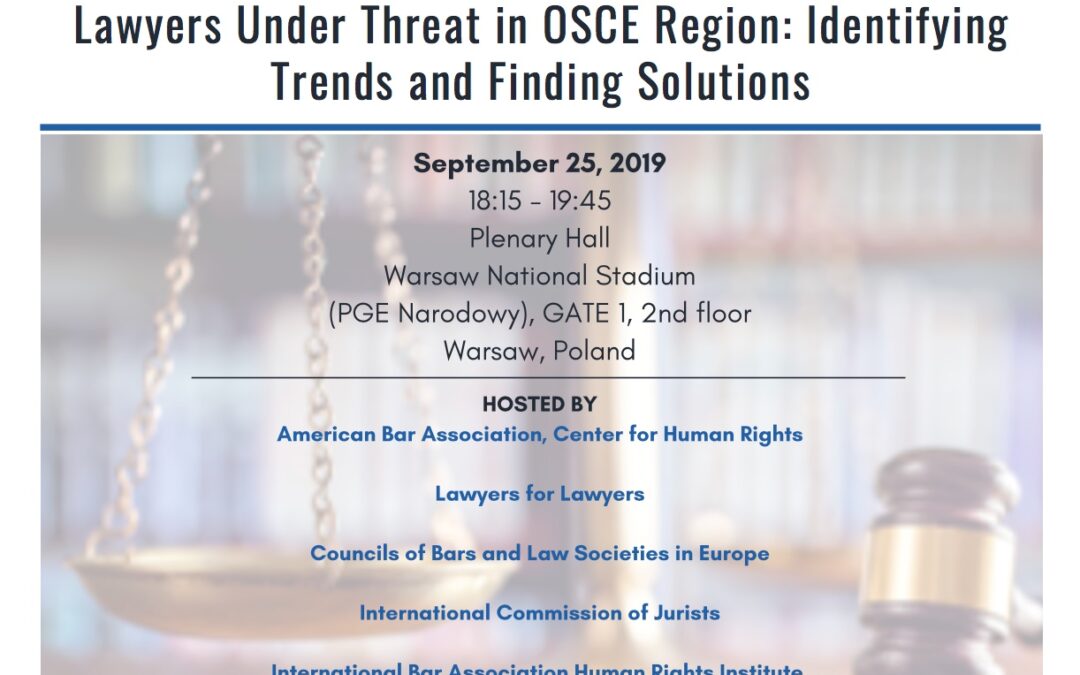
Apr 1, 2022 | News
Today, the ICJ condemned the arrest and five-day detention of Nurbek Toktakunov, a prominent Kyrgyzstan lawyer, for the administrative offence of “hooliganism”. The detention appears to have been based solely on his exercise of his right to freedom of expression, in particular on comments he made criticizing the justice system of Kyrgyzstan and is therefore unsustainable.
Nurbek Toktakunov’s arrest and detention for exercise of his freedom of expression, constitute violations of article 9 (freedom from arbitrary detention), 14 (the right to fair trial) and 19 (freedom of expression) of the International Covenant on Civil and Political Rights (ICCPR), to which Kyrgyzstan is a party. The action against Nurbek Tortakunaov also contravenes international standards on the role of lawyers.
“We are concerned that Nurbek Toktakunov’s arrest and detention resulted from the expression of his personal opinions on the problems of the functioning of the justice system in Kyrgyzstan, including in regard to the ban on rallies, which are matters of public importance for the society”, said Temur Shakirov, ICJ Senior Legal Adviser. “The lawyer’s comments were not made in court and were made outside of any legal proceedings, and in that context lawyers, like any other person, have the right to express their views, including those which are critical”
The ICJ also calls on the authorities to ensure that lawyers are able to perform all of their professional functions without intimidation, hindrance, harassment or improper interference, and to exercise their freedom of peaceful assembly and freedom of expression, as required by the ICCPR and reflected in the UN Basic Principles on the Role of Lawyers.
On 24 March 2022, Nurbek Toktakunov was sentenced to five days’ detention by the Pervomaisky District Court for the administrative offence of petty hooliganism, which was allegedly committed by “insulting all the judges of the country” in a public place. He made his comments during a rally against the Russian invasion of Ukraine near the Russian Embassy in Bishkek. Nurbek Toktakunov said that the court decision to ban rallies near the diplomatic mission building was unconstitutional. He reportedly characterized judges in Kyrgyzstan as being “no one”. Nurbek Toktakunov was released on 30 March.
Earlier, the Pervomaisky District Court of Bishkek restricted the holding of peace demonstrations at the Russian Embassy, Ala-Too Square, the Parliament and Presidential Administration. The ban is in effect from March 11 to April 11 (inclusive). The ICJ is concerned that the ban, which was not publicly announced when it was made, appears to be in violation of article 21 of the ICCPR which protects the right to peaceful assembly. Under international law, any restrictions on assemblies in and around such places must be specifically justified and narrowly circumscribed.
Three other activists, Aziza Abdirasulova, Dinara Oshurahunova and Ondyrysh Toktonasyrov, were fined 3000 soms after the banned rally, for disobeying the demands of police officers who called on leave the rally. Nurbek Toktakunov claimed that he was their legal representative at the rally. He denied using obscene language and referred to his other critical statements.
The right to freedom of expression is protected under article 19 of the ICCPR. The UN Human Rights Committee has emphasized that in respect of public debate regarding public institutions “the value placed by the Covenant upon uninhibited expression is particularly high in the circumstances of public debate concerning figures in the public and political domain.”
The ICJ stresses that according to the UN Basic Principles on the Role of Lawyers, “[l]awyers like other citizens are entitled to freedom of expression, belief, association and assembly. In particular, they shall have the right to take part in public discussion of matters concerning the law, the administration of justice and the promotion and protection of human rights […]” (Principle 23).
Additional information
The UN Human Rights Committee’s General Comment No. 37 on the right of peaceful assembly (Article 21 ICCPR) states that:
“36. While the right of peaceful assembly may in certain cases be limited, the onus is on the authorities to justify any restrictions. Authorities must be able to show that any restrictions meet the requirement of legality, and are also both necessary for and proportionate to at least one of the permissible grounds for restrictions enumerated in article 21, as discussed below. Where this onus is not met, article 21 is violated. The imposition of any restrictions should be guided by the objective of facilitating the right, rather than seeking unnecessary and disproportionate limitations on it. […]
56. The designation of the perimeters of places such as courts, parliaments, sites of historical significance or other official buildings as areas where assemblies may not take place should generally be avoided, inter alia, because these are public spaces. Any restrictions on assemblies in and around such places must be specifically justified and narrowly circumscribed”
The UN Human Rights Committee’s General Comment No 34 on the right of freedom of opinion and expression (Article 19 ICCPR) states that:
“23. States parties should put in place effective measures to protect against attacks aimed at silencing those exercising their right to freedom of expression. Paragraph 3 may never be invoked as a justification for the muzzling of any advocacy of multi-party democracy, democratic tenets and human rights. Nor, under any circumstance, can an attack on a person, because of the exercise of his or her freedom of opinion or expression, including such forms of attack as arbitrary arrest, torture, threats to life and killing, be compatible with article 19. Journalists are frequently subjected to such threats, intimidation and attacks because of their activities. So too are persons who engage in the gathering and analysis of information on the human rights situation and who publish human rights-related reports, including judges and lawyers. All such attacks should be vigorously investigated in a timely fashion, and the perpetrators prosecuted, and the victims, or, in the case of killings, their representatives, be in receipt of appropriate forms of redress.”
Donwload this webstory in Russian

Sep 14, 2020 | Advocacy, Cases, Legal submissions
The ICJ and ECRE intervened today before the Grand Chamber of the European Court of Human Rights in the case of the extradition of a Kyrgyz national of Uzbek ethnicity back to his country of origin where he would be at risk of torture or other forms of ill-treatment .
In their submissions, the ICJ and the European Council on Refugees and Exiles (ECRE) analysed thenon-refoulement obligations of the Russian Federation under international human rights law in relation to the consideration of evidence to assess the substantial grounds to believe that a concerned person will face real risk of a serious human rights violation; and the use of diplomatic assurances purportedly to protect against torture and other serious human rights violations in light of international law.
The two NGOs also provided the Court with an update on the legal framework governing extraditions from the Russian Federation to Central Asian States, in particular Kyrgyzstan, as well as Russia’s extradition practice. They concluded that the analysis of the law and practice revealed a number of critical human rights deficits.
They submitted that the lack of respect for the procedural aspect of the principle of non-refoulement, the consequent ineffectiveness of domestic remedies in this regard, in the Russian Federation, and the abysmal record of Kyrgyzstan in upholding its obligation to respect and protect the prohibition of torture or other ill-treatment mean that extraditions from the Russian Federation to Kyrgyzstan entail a high risk of violations of both substantive and procedural aspects of the principle of non-refoulement.
These submissions are an update of the third party intervention submitted by the ICJ before the Chamber of the European Court of Human Rights on 22 September 2016. The Chamber had ruled that no risk of breach of the principle of non-refoulement existed in the case but the judgment is now subject to the review of the Grand Chamber.
ECtHR-TK and others v Russia-GC-ICJECRE-Final (download the third party intervention)

Jul 30, 2020 | Advocacy
The ICJ is concerned that in Kazakhstan, Kyrgyz Republic, Tajikistan and Uzbekistan the COVID-19 pandemic, and measures taken purportedly to contain it, have significantly curtailed access to justice. Restrictions have affected the operation of the courts and impeded lawyers’ ability to provide effective legal assistance to their clients.
In the context of the COVID-19 pandemic — whether under a state of emergency or not — States’ obligations under international human rights law to uphold the fundamental guarantees of a fair trial, and to ensure access to effective remedies for violations of human rights endure.
The right to a fair trial entails the right to adequate time and facilities to prepare a defense, which, in turn, requires the opportunity to communicate with one’s lawyer effectively and in confidence.
In light of this, the ICJ calls on Central Asian States to ensure that, while COVID-19 restrictions are in place, access to a lawyer continues to be ensured, and that measures be put in place so that lawyers are able to communicate with their clients safely, effectively and confidentially, including in places of detention or during online hearings.
In addition, wherever and whenever the authorities put in place restrictions on physical meetings or travel with the stated purpose of containing the COVID-19 pandemic, the ICJ calls on Central Asian States to ensure that access to court is guaranteed through specific legal, administrative and practical measures.
ICJ research and discussions with lawyers have shown that across Central Asia, regulations adopted during COVID-19 relating to the administration of justice have suffered from vague language, inconsistencies and unclear guidance.
In practice, this had serious implications for the right to fair trial of defendants: in some cases defence lawyers were not allowed to meet their clients who were charged with serious crimes; in other instances lawyer-client meetings were very short, undermining the ability of lawyers to take proper instructions from their clients and to advise them accordingly; in other cases defence lawyers met their clients in circumstances where the confidentiality of their communication was compromised as a result of the virtual communication platforms they were forced to use.
The restriction measures relating to the administration of justice that the authorities have imposed have also had negative consequences for access to justice and effective remedies for victims of human rights violations; notably, access to legal assistance in domestic violence cases was impeded across the region.
In many court buildings social distancing requirements were not adjusted in such a way as to uphold the right to a public hearing. There has been a lack of sufficient guidance on how the right to a public hearing may be ensured online, including as to how the right to equality of arms and the right to legal representation would be protected.
Download
Central Asia-Statement COVID-19-Advocacy 2020-ENG (full article with additional information, in PDF)

Nov 28, 2019 | Events, News
Today, the ICJ, together with the Constitutional Chamber of the Supreme Court of Kyrgyzstan, OHCHR and UNODC are holding a meeting of judges from Central Asia to discuss international law and standards in the field of extradition, expulsion, the rule of law and human rights.
The workshop aims to facilitate exchange of experiences regarding the law and practice of extradition and expulsion in European and Central Asian countries. Presentations at the workshop will analyse international law and standards on effective criminal justice co-operation and the protection of human rights in extradition and expulsion, and their application in practice.
The workshop will present cases from national courts as well as from international mechanisms such as the European Court of Human Rights, the UN Committee against Torture and the UN Human Rights Committee.
The workshop is taking place in Bishkek (Kyrgyzstan) and is hosted by the Constitutional Chamber of the Supreme Court of Kyrgyzstan.
Judges from Kazakhstan and Uzbekistan are participating in the event that includes international experts from UNODC, ICJ, and Italian Judge Elena Masetti Zannini.
See the agenda of the day in English and in Russian.

Sep 24, 2019 | Events, News
The side event aims to identify current threats against lawyers’ professional rights and guarantees in the OSCE region.
The speakers will identify and analyze the current trends through a discussion of recently gathered data and specific cases of violation of lawyers’ rights from Kyrgyzstan, Kazakhstan, Tajikistan, Moldova, Ukraine, Azerbaijan, Russia and Belarus. They will also make recommendations regarding the way forward to increase protection for lawyers and the independent legal profession in these countries and the OSCE region as a whole.
A flyer for the event is available here.
The agenda for the event available here.





